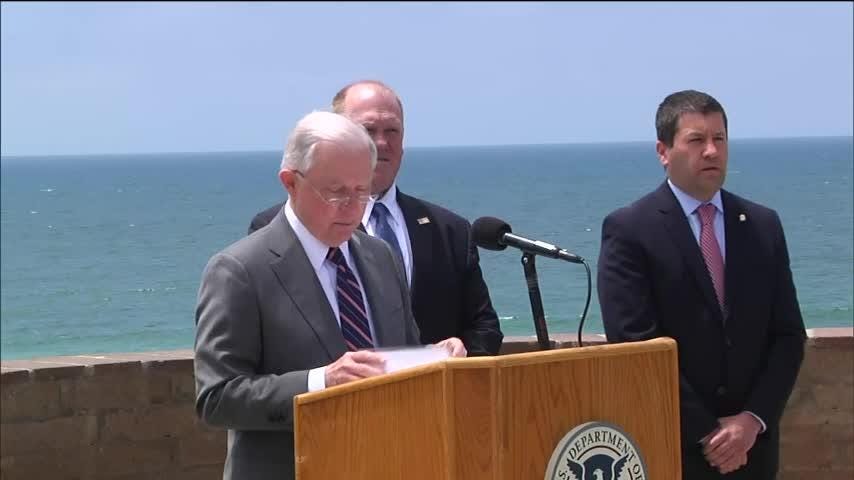Results 1 to 1 of 1
Thread Information
Users Browsing this Thread
There are currently 1 users browsing this thread. (0 members and 1 guests)
-
05-31-2018, 01:03 AM #1
Illegal aliens are increasing
Illegal aliens are increasing
6:00 p.m. ET May 30, 2018 | Updated 9:16 p.m. ET May 30, 2018

US Attorney General Jeff Sessions says he's placed a "zero tolerance policy" for anyone who enters the country illegally on the Mexican border. (May 7) AP
Prosecutions deter illegal immigration, avoiding the dangers for families: Opposing view
Migrant children at a detention center in Nogales, Ariz., in 2014.(Photo: Ross D. Franklin, AP)
The government recently said it would prosecute aliens entering illegally, even those traveling with children. This seemingly harsh policy actually protects foreign nationals.
Illegal entry is a crime. Prosecuting illegal entrants deters it. Deterrence avoids the dangers of smuggling, as women and children “often find themselves at risk for assault and abuse such as rape, beatings, kidnapping and robbery” at smugglers’ hands, according to Immigration and Customs Enforcement.
Illegal entry by families has been increasing. In April 2017, 1,118 family-unit aliens were apprehended entering illegally. One year later, 9,647 were.
The makeup of aliens entering illegally has also changed. Before 2011, more than 90% of arriving aliens were single adult males; today, 40% are families and children.
Why? Aliens believe they won’t be detained if they arrive with children.
The Department of Health and Human Services makes placement determinations for unaccompanied alien children. Under recent interpretations of a 1997 settlement agreement, there is a presumption that apprehended alien minors (even those arriving with parents) will be released to HHS within 20 days.
A Democrat-sponsored 2008 trafficking law divides unaccompanied children into two groups: Canadians and Mexicans (who can be returned quickly), and everybody else. The latter go to HHS, even if they haven’t been trafficked, and aren’t unaccompanied because they have family here. They must be “placed in the least restrictive setting,” usually meaning release to family members.
Previously, parents in family units were typically also released. Thus, the most effective deterrent — detention — did not discourage their illegal entry. But parents and children are separated in criminal court daily; immigration prosecutions shouldn’t be different.
For families legitimately fleeing persecution, there are two other options: applying for asylum elsewhere (like Mexico), or applying at a port of entry.
Separately, news reports state that HHS cannot reach sponsors of 1,475 placed unaccompanied alien children. This also occurred under the Obama administration but is likely only news now because of the Trump separation policy.
It isn’t surprising that sponsors here illegally would evade government scrutiny. The solution is humane detention of all illegal crossers, under government protection, until their cases can be heard.
https://www.usatoday.com/story/opini...ates/35513539/
Support our FIGHT AGAINST illegal immigration & Amnesty by joining our E-mail Alerts athttp://eepurl.com/cktGTn
Similar Threads
-
Immigration analyst: Illegals aliens increasing because they’re waiting for amnesty
By HAPPY2BME in forum illegal immigration News Stories & ReportsReplies: 2Last Post: 09-28-2013, 05:55 PM -
Illegal Aliens from Mexico Increasing Assaults on Border Patrol Agents
By Jean in forum illegal immigration News Stories & ReportsReplies: 0Last Post: 09-24-2013, 05:40 PM -
Illegal Aliens Criminal Activities Increasing In America:
By Pisces_2010 in forum illegal immigration News Stories & ReportsReplies: 29Last Post: 01-24-2011, 02:25 PM -
Ad Claims Ever-Increasing Traffic Caused by Ever-Increasing
By zeezil in forum illegal immigration News Stories & ReportsReplies: 3Last Post: 06-02-2008, 12:26 AM


 1Likes
1Likes LinkBack URL
LinkBack URL About LinkBacks
About LinkBacks





 Reply With Quote
Reply With Quote


"YOU WILL FOOT THE BILL FOR ILLEGAL IMMIGRANTS!" GOVERNOR HOCHUL...
04-23-2024, 05:46 AM in Videos about Illegal Immigration, refugee programs, globalism, & socialism